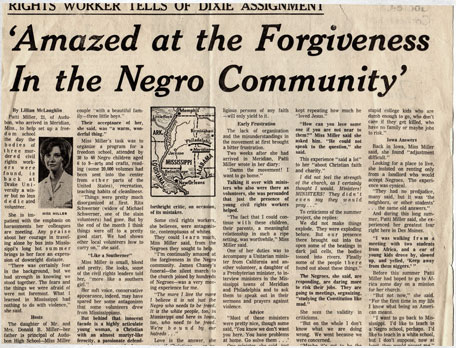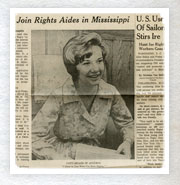![]()
Newspaper Articles
![]()
- Iowan captures summer of 1964, The Hawkeye, February 14, 2006
- Civil Rights worker remembers joys, tears of 'Freedom Summer,' Quad-City Times, May 7, 2006
- Will Join Rights Aides in Mississippi, Des Moines Tribune, June 26, 1964
- Clippings from Audubon News-Advocate, July, 1964
- Rights Worker Tells of Dixie Assignment, Des Moines Tribune, Sept. 23, 1964
- Views Racial Situation After Mississippi Project , Drake Times-Delphic , Sept. 25, 1964
![]()

Des Moines Tribune
Sept. 23, 1964
RIGHTS WORKER TELLS OF DIXIE ASSIGNMENT
'Amazed at the Forgiveness In the Negro Community'
by Lillian McLaughlin
Patti Miller, 21, of Audubon, who arrived in Meridian, Miss., to help set up a freedom school the day the bodies of three murdered civil rights workers were found, is back at Drake University a wiser but no less dedicated volunteer.
She is impatient with the emphasis on harassments her colleagues are meeting. Any praise about her courage in traveling alone by bus into Mississippi’s long hot summer brings to her face an expression of downright distaste.
“There was certainly fear in the background, but we had strength in knowing we stood together. The fears and the things we were afraid of were not foremost. What I learned in Mississippi had nothing to do with violence,” she said.
The daughter of Mr. And Mrs. Donald B. Miller – her father is principal of Audubon High School – Miss Miller lived in the home of a Negro couple “with a beautiful family – three little boys.”
Their acceptance of her, she said, was “a warm, wonderful thing.”
Miss Miller’s task was to organize a program for a freedom school, attended by 30-40 Negro children aged 6-9 – arts and crafts, reading (some 20,000 volumes had been sent into the center from other parts of the United States), recreation, teaching habits of cleanliness.
“Things were pretty much disorganized at first. Rita Schwerner (widow of Michael Schwerner, one of the slain volunteers) had gone. But by the end of the month I think things were off to a pretty good start. We had shown other local volunteers how to carry on,” she said.
Miss Miller is small, blond and pretty. She looks, some of the civil rights leaders told her, “more like a southern girl.”
Her soft voice, conservative appearance, indeed, may have spared her some antagonism that some volunteers drew from Mississippians.
But behind that innocent façade is a highly articulate young woman, a Christian with an almost martyr-like ferocity, a passionate defender of her cause, and also a forthright critic, on occasion, of its mistakes.
Some civil rights workers, she believes, were antagonistic, contemptuous of whites.
They could learn much, Miss Miller said, from the Negroes they sought to help.
“I’m continually amazed at the forgiveness in the Negro community. James Chaney’s funeral – the silent march to the church joined by hundreds of Negroes – was a very moving experience for me.
“The more I live the more I believe it is not just the Negro who needs to be freed. It is the white people, too, in Mississippi and here in Iowa, too, who need to be freed. We’re bound by our hatreds…”
Love is the answer, she says, if Christians – or religious persons of any faith – will only yield to it.
The lack of organization and the misunderstanding in the movement at first brought a bitter frustration.
Two weeks after she had arrived in Meridian, Patti Miller wrote in her diary: “Damn the movement! I want to go home.”
Talking it over with ministers who also were there as volunteers, she was persuaded that just the presence of young civil rights workers helped.
“The fact that I could continue with these children, their parents, a meaningful relationship in such a ripe setting was worthwhile,” Miss Miller said.
One of her duties was to accompany a Unitarian minister from California and another volunteer, a daughter of a Presbyterian miniter, to interview ministers in the Mississippi towns of Meridian and Philadelphia and to ask them to speak out in their srmons and prayers against violence. “Most of these ministers were pretty nice, though some said, ‘You have problems at home. Go solve them……”
One minister, she said, just kept repeating how much he loved Jesus.”
How can you love someone if you are not near to them?” Miss Miller said she asked him. “He could not speak to the question,” she said.
This experience “said a lot” to her “about Christian faith and charity. I did not feel the strength of the church, as I certainly thought I would. Ministers! Ministers! They didn’t even say they would pray………”
To criticisms of of the summer project, she replies:
“We did not make things explode. They were exploding before. But our presence there brought out into the open some of the beatings in dark jail cells, the bodies tossed into rivers. Finally some of the people there found out about these things.”
The Negroes, she said, are responding, are daring more to risk their jobs. They are going to meetings, organizing, “studying the Constitution like mad.”
She sees the validity in criticisms.
‘But on the whole I don’t know what we are doing wrong. We
went because we were concerned.
“Maybe it’s got to be the stupid college kids who are dumb enough to go, who don’t care if they get killed, who have no family or maybe jobs to risk.”
Back in Iowa, Miss Miller said, she found “adjustment difficult”
Looking for a place to live, she insisted on renting only from a landlord who would accept Negroes. The experience was cynical.
“They had no prejudice, many said, but it was ‘the neighbors, or other students’……….the same old answers.”
And during this long summer, Patti Miller said, she experienced her greatest fear right here in Des Moines.
“I was walking from a meeting with two students from Africa, and a car of young kids drove by, slowed up, and yelled, ‘Keep away from them niggers.’”

